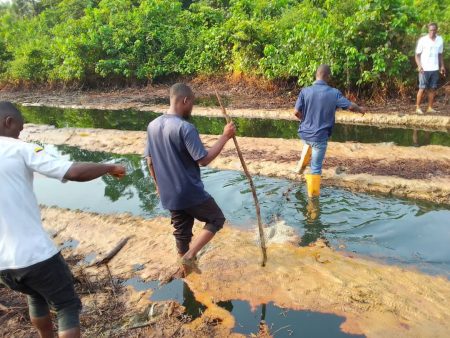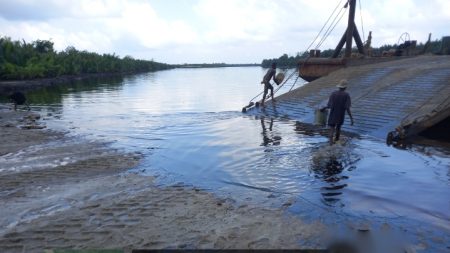 *‘Further fuel subsidy removal is uncalled for’
*‘Further fuel subsidy removal is uncalled for’
30 March 2013, Lagos – The pronouncement by President Goodluck Jonathan on a new strategy by the Federal Government to remove fuel subsidy has sparked another round of controversy. While some stakeholders say the money allocated for fuel subsidy in the budget must be channelled into agriculture, housing and other sectors to reposition the economy for rapid growth and development, others warn government against the removal.
The Western Zonal Chairman, National Union of Petroleum and Natural Gas Workers (NUPENG), Alhaji Tokunbo Korodo, speaks on the need for government to avoid any issue that may further worsen the security situation in the country, which, according to him, any attempt to remove the remaining subsidy on petrol portends. Excerpt:
The president recently declared that government will not continue to waste resources meant for the Nigerian people to pay fuel subsidy, which, government says, benefits the affluent and the middle class more than the masses. What is your position?
To start with, government should not be talking about fuel subsidy now, when the economy is dwindling due to perennial security crisis and increasing rate of poverty in the country. The issue of fuel subsidy now is not encouraging, because it can further provoke the people. Government should focus on economic transformation in the areas of providing security to stop incessant killings of innocent citizens, creation of jobs to tackle the alarming rate of unemployment in the country, especially among the youths, and infrastructural development. This is what Nigerians want to hear. Government should avoid anything that will pave the way for a strike action because that may even worsen the security situation in the country.
Have you also considered the explanation from government that subsidy money goes into the hands of few individuals to the detriment of the masses that you are trying to protect?
Well, the leakages in the system in terms of corruption, misappropriation of public funds and subsidy money going into the hands of few influential individuals in the country must be blamed on the inefficiency on the part of government to check the excesses in the economy. So, government should not blame its inefficiency on the people. For instance, government has been advocating the Subsidy Reinvestment and Empowerment Programme (SURE-P) which, they said, is designed to enhance immediate socio-economic status of our economy with resources realised from the partial removal of subsidy in January 2012, yet, we cannot feel the impact.
We could recall that by January 1, 2012, government took everyone by surprise, when they removed the subsidy without due consultation with the people and representatives of labour unions. They increased the pump price of fuel from N65 per litre to N141 but the week-long mass protests compelled government to shift ground by reducing the price to N97 per litre, which is still too high for some people to purchase. Government should be able to tell the people how they utilised the money that was removed from the subsidy to improve the economy for better productivity. What I mean here is the partial removal of the subsidy money.
Millions of Nigerians remain unemployed. We are still witnessing infrastructure decay and epileptic supply of electricity. Even few companies that are absorbing the work force now are using casual workers. We have a situation in this country where many Nigerians are employed as casual workers without any benefit. Also, our roads are so terrible. The state of the roads is posing a serious challenge to distribution of petroleum products across the country. For example, many of our members have lost their lives in fatal accidents due to bad roads.
Instead of subsidy removal to further impoverish the people, government should turn attention to power failure, which has also become a major issue in the country. The lingering power crisis is not good for a developing economy like Nigeria . We may not achieve tangible economic growth and development with erratic power supply that is almost crippling every sector of the economy. Even the operators of Small and Medium Enterprises (SMEs) in the country need constant electricity to remain in business.
Now, government is talking about Vision 20:2020, when the power sector is not generating sufficient capacity to meet the demand of electricity consumers in the industrial sector and for domestic use. For government to achieve its Vision, it must tackle power failure pragmatically and holistically within a stipulated period. The security situation must also be given attention, if we must move forward.
The report on fuel subsidy scam revealed that over $6bn was looted from subsidy funds in the past two years. Why is government not proactive about prosecuting individuals behind this fraud?
Well, they say the matter is in court already but let us see what will be the outcome. We have similar cases of people defrauding government and, at the end, nothing tangible came out of it. I hope the subsidy case will not go the same way. We are watching to see what will be the outcome.
At present, the official pump price of fuel remains N97 per litre. Why are some service outlets selling at N100 and above?
The reality is that our economy is not stable. As such, the prices of goods and services are not also stable. For instance, the pump price is N97 per litre, but the scarcity in the system makes if difficult for people to get the product at uniform price. Aside that, you know Nigerians with their attitude. When a product is scarce in the market, it must be made to attract increase in price. This is exactly what is happening. This is the more reason we do not want to hear anything about subsidy removal now. This is because such a pronouncement can even trigger artificial scarcity and panic buying. Some people immediately they hear fuel subsidy removal can begin to store petrol in their houses.
Beyond that, some of the people selling above the official pump price may also be getting their product through the black market rate. For instance, if some are buying between N97 and N100 per litre, what do you expect them to do? In business, people must make profit at least to improve their margin in order to stay afloat. So, you cannot also blame. What we are saying is that government should create an enabling environment for price stability and availability of product at all times as well as putting measures in place to find lasting solution to insecurity in the country, instead of subsidy removal.
Do you think that the Department of Petroleum Resource (DPR) is doing enough to check the problem of under-dispensing of product by the service outlets?
The DPR is doing its best at the moment, but the approach of sealing the filling stations across the country is not the solution to the problem. Rather, it may further aggravate the situation and increase the rate of scarcity in the system. This implies that the level of scarcity may increase and people can resort to patronising Jerry-can black marketers.
Udeme Clement, Vanguard



